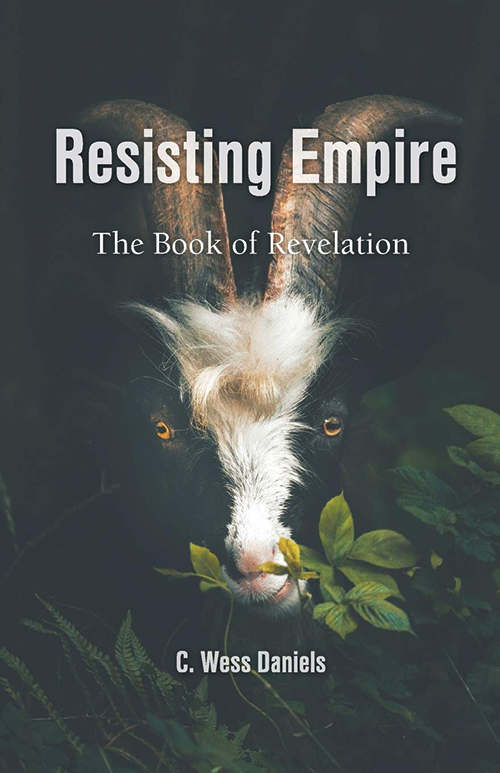
Resisting Empire: The Book of Revelation
Reviewed by Rob Pierson
November 1, 2020
By C. Wess Daniels. Barclay Press, 2019. 136 pages. $16/paperback; $3.99/eBook.
The Revelation, or Apocalypse, of John of Patmos is the last and for many the most troublesome of books of the New Testament. It’s not a normal narrative; it’s a dream, a vision, a story of wonders. It has dragons for heaven’s sake, as well as beasts full of horns and eyes, horses of unnatural color, a conquering lamb who is also a lion, and a cubic city 1,000 miles high descending out of the sky.
“Revelation” means to pull back the veil, to reveal what is hidden. But what does it disclose? The way things end? (We’ve certainly had quite enough of that interpretation.)
Or does it disclose the way things are? Does it pull back the veil on the violence of the empire (ancient and modern) and urge us to resist?
C. Wess Daniels’s short book, Resisting Empire, invites us to read Revelation from the perspective of the poor, the oppressed, the victims of empire—to read “with imagination and empathy.” With Daniels, we look for the subversive elements of this ancient text. We stop asking “what does it mean?” and instead ask “how do we live into this vision?”
Daniels calls his book a tapestry, but to me it feels more like a scrapbook or collage. The individual essays are reflections or sermons, some with associated queries. They consider pieces of Revelation in the light of one of four overarching themes: (1) scapegoating—how the empire forges community by exclusion, by blaming “the other”; (2) imperial economics—how the empire maintains wealth for the few at the expense of the many; (3) liturgy—how the empire creates its own practices, rituals, language, and symbols, effectively establishing its own form of worship entirely at odds with the worship of the lamb; and (4) the multitude—Revelation’s vision of a community that welcomes others and pulls the victims of the empire from the margins to the center of our community’s concern.
Anyone looking for a critical verse-by-verse analysis should look elsewhere. Daniels is playing fast and somewhat loose with themes and imagery. There are plenty of study guides for the Book of Revelation and excellent writings about the importance of that book to George Fox and early Friends (see Douglas Gwyn’s Apocalypse of the Word). What Daniels adds is a remix of apocalypse for those seeking to live out a gospel of liberation in the face of a world hell-bent on oppression.
I’ve led Bible studies involving the full range of Quakers—from those carrying dog-eared Bibles to those who’ve never cracked the book open, including those who’ve only experienced the Bible as a weapon used to bludgeon “others.” There’s something in Daniels’s book for all these Friends—an open door to what seemed a closed book, an invitation to listen to old words with new ears, a call to re-awaken our imagination and to stand with the marginalized and resist.
The empire around us, says Daniels, “is a whole way of thinking, acting, and worshiping in the world.” The Book of Revelation offers an alternative vision: a community of worship formed around the self-giving love of “the lamb that was slain.”
“Don’t be duped by the emperor’s sorcery,” writes Daniels, summarizing very precisely the whole book of Revelation:
Be that alternative community—the multitude—that rejects the beastly economics of the empire, and follow the lamb that was slain. He will lead you to life and victory. This is happening right now, right here.
Be that alternative community—the multitude—that rejects the beastly economics of the empire, and follow the lamb that was slain. He will lead you to life and victory. This is happening right now, right here.
You don’t have to wait.
God is with you now.
Now is the time of victory,
so live as though that reality is here.
Rob Pierson is a member of Albuquerque (N.M.) Meeting; a graduate of the Earlham School of Religion; and a person who appreciates Bible study, whether or not the study features dragons.


